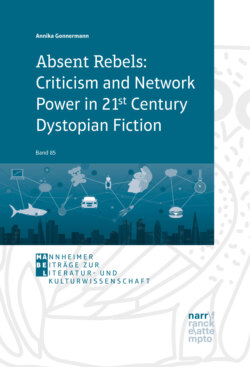Читать книгу Absent Rebels: Criticism and Network Power in 21st Century Dystopian Fiction - Annika Gonnermann - Страница 14
На сайте Литреса книга снята с продажи.
Theorising Neoliberal Capitalism and Globalisation
ОглавлениеNeoliberalism – just like Fordism or Taylorism – is a historically bound formation, that is to say, a specific manifestation of the current macro-economic, political, and social system commonly referred to as capitalism (cf. Dörre 47).1 Demarcating capitalism from earlier forms of socio-political and economic systems such as feudalism, Ellen M. Wood defines capitalism in The Origin of Capitalism (1999) as a movement starting approximately in the 16th and 17th century, “in which goods and services, down to the most basic necessities of life, are produced for profitable exchange, where even human labour-power is a commodity for sale in the market, and where all economic factors are dependent on the market” (2). If capitalism is thus defined as a historical process, favouring market exchange (most notably in the form of wage labour) as the principal mode of societal regulation (cf. Best 500), neoliberalism can be thought of as capitalism’s logical, global extension, its current “stage” ever since the 1970s:2 it is the “political, economic, and special arrangements within society that emphasize market relations, re-tasking the role of the state, and individual responsibility. [It is] broadly defined as the extension of competitive markets into all areas of life” (Springer, Birch, and MacLeavy 2).3
Moreover, neoliberalism connects the two phenomena globalisation and capitalism (cf. Grewal 247). Commonly associated with the rise of neoliberalism, globalisation is defined as a specific set of socio-economic changes dating from the 1970s (cf. Eagleton-Pierce 17), which include, among others, the “international dispersal of production and consumption” and “rapid technological development, especially in communicative technology and a concomitant expansion of speculative capital and the dematerialization of value” (Connell 225). While globalisation had of course started centuries before (one might think of the British East India Trading Company, which promoted intercontinental trade as early as 1600), it is the specific nexus between neoliberalism and globalisation that is of particular interest to this analysis. Alain Touraine, too, connects the two phenomena on a fundamental level, stating that “[g]lobalization means the triumph of economic forces that are increasingly organized at the world level, while political, legal, and social agents retain very limited if any capacity to intervene at this level at all” (270),4 thus commenting on the increasing divide between international and national power.5 Neoliberalism denotes “a historical situation in which structure, politics and society have embraced the market as an ethics, as the universal determinant of life and human activity” (Nilges 162),6 thereby substituting any other guideline for human behaviour.7 Valuing market exchange as a universal standard, the aim of neoliberalism is to “maximiz[e] the reach and frequency of market transactions” (Harvey, Neoliberalism 3), seeking to “bring all human action into the domain of the market” (ibid.), – even those areas previously untapped. In short, neoliberalism has “become hegemonic as a mode of discourse” (ibid.), dominating in theory and practice the way we structure our lives.
The free market focuses not so much on macro-structures but zooms in on the individual: to say it in the words of Matthew Eagleton-Pierce, “the individual tends to acquire ontological priority over the collective” (19). Neoliberalism turns individuals into the homo oeconomicus, identifying them as the centre of all responsibility of action.8 As Ralph Fevre writes in Individualism and Inequality (2016), in a neoliberalist setting, “people are expected to know their own minds, and be able to make plans, and take decisions, which help them to achieve personal objectives” (5). Moreover, as David Harvey adds, “[a] ‘personal responsibility system’ […] is substituted for social protections (pensions, health care, protections against injury) that were formerly an obligation of employers and the state” (Neoliberalism 168). In a life free of state intervention (only as a last resort to stabilise markets), the market becomes the yardstick for social action, the individual within the market the architect of his or her own fortune – the basis for a American understanding of individualism (cf. Eagleton-Pierce 20). The promise: life will be better and free of coercive control.9
